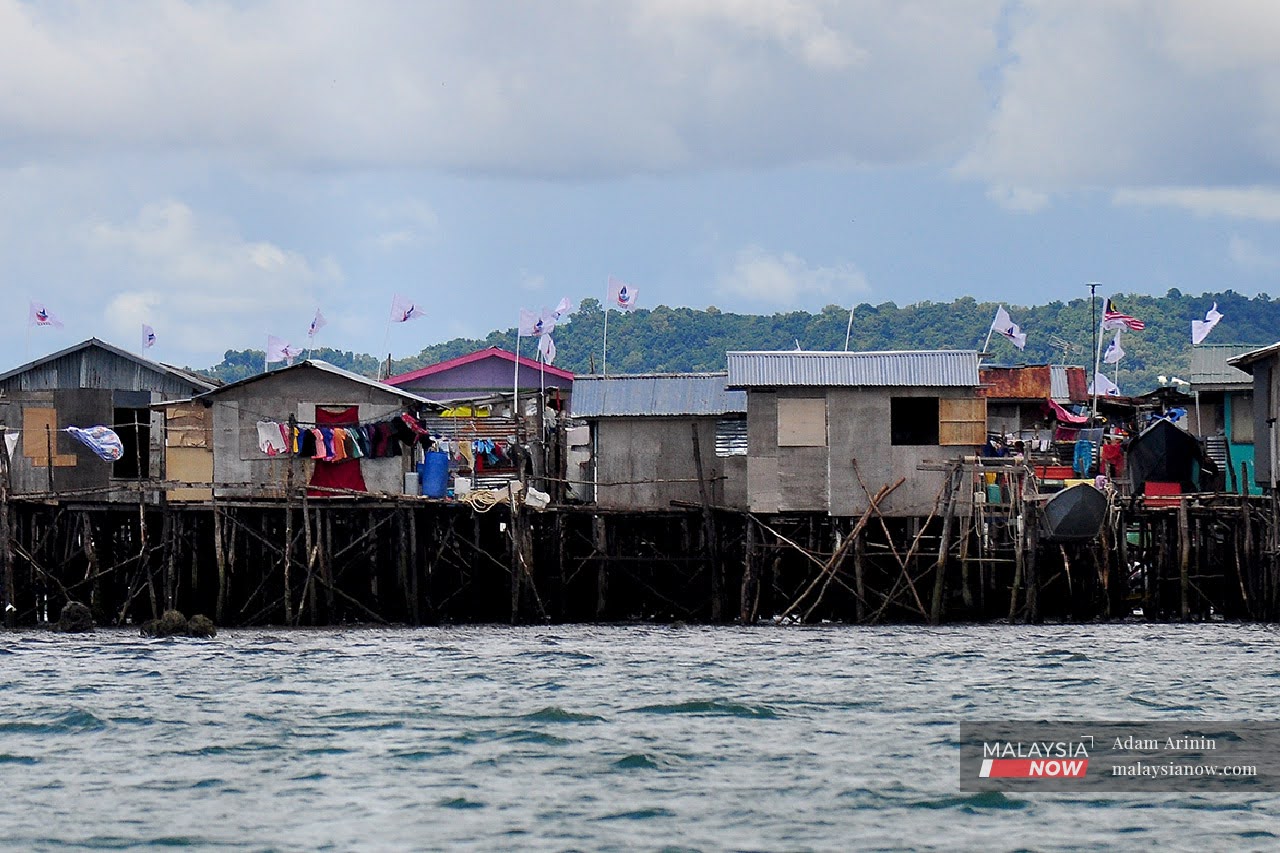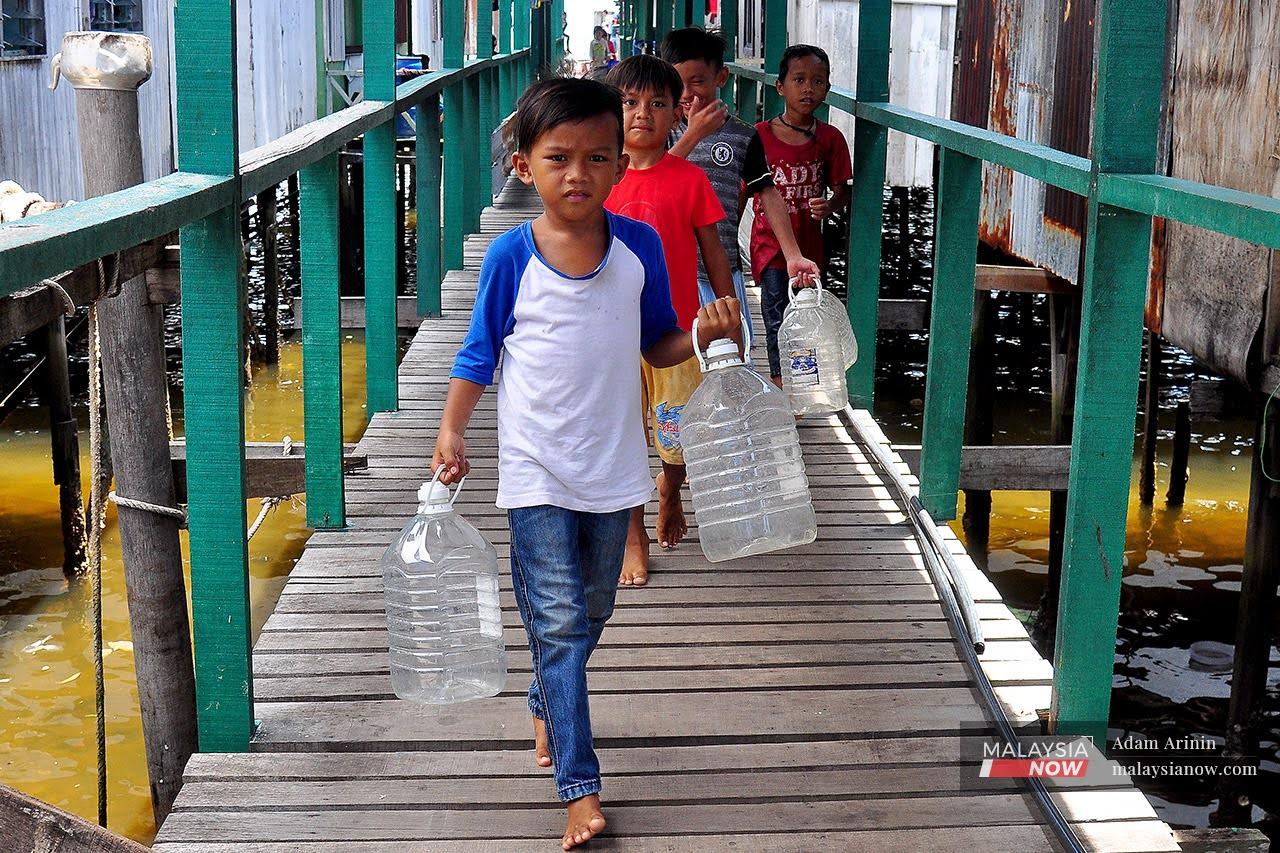The watery problem of Sabah’s water villages
At the moment, villagers must fork out RM7 per 220-litre barrel of water.
Just In
In Kampung Kesuapan, Pulau Gaya, Sabah, houses are carefully constructed to balance on stilts above water.
It is known as a water village, but the term belies its biggest problem: the villagers have been without clean water supply for as long as they can remember.
Even their children are aware of the problem and know they have a part to play.
“We want to go fetch water,” a group of them told MalaysiaNow on a recent visit to the village.
Armed with empty plastic bottles, their mission has been made clear to them.
“There is no clean water at our house. Our mother told us to get some for cooking and drinking.”
The same situation can be found in many villages in Pulau Gaya, which is located a 10-minute boat ride from Kota Kinabalu.
Two years ago, they were promised a supply of clean water as one of Warisan’s election pledges ahead of the May 9 polls.
After Warisan came to power in Sabah, Agriculture and Food Industry Minister Junz Wong announced a project under which pipes would be installed in every house to ensure clean water supply throughout the island.
The pilot project, worth RM5.3 million, was to involve two villages in Pulau Gaya – Kampung Kesuapan and Kampung Pulau Gaya – with 510 homes fitted with such pipes.
But thanks to the Covid-19 pandemic which hit the country early this year, the project has been largely abandoned.
Now, the villagers are forced to buy clean water sold in barrels on boats each day.
A single barrel can hold up to 220 litres of water and costs RM7. But this can quickly add up, especially for large households.

Fisherman Asadin Umbok, 60, must fork out over RM500 a month to get enough water for his 11 children.
“I have to buy five barrels of water every two days,” he told MalaysiaNow. “This comes up to RM525 a month.”
Times are hard now for many and Asadin is no exception. His income from catching fish is never certain, and it’s difficult for him to plan his expenses.
But he is thankful for the Covid-19 assistance he received from the government and says his situation used to be worse.
Before this, he would have to wait for water to be delivered to the village each day, sometimes as early as 5am. Once it arrived, he would have to jostle with others in order to get enough for himself and his family.
Long-standing problem
Water woes are nothing new for Sabah. In 2016, it was rocked by a scandal linked to its water department which saw the Malaysian Anti-Corruption Commission (MACC) reel in a historic haul of cash, luxury vehicles, land grants and other assets worth nearly RM200 million in connection with bribery and a RM3.3 billion project.
Two senior officers from the Sabah Water Department were arrested to facilitate investigations, and the case remains ongoing in court.
In 2018, several months after the 14th general election which saw Warisan wrest Sabah from Barisan Nasional, the state infrastructure development ministry set five targets regarding the development of water treatment, to be achieved by 2020.
Its minister Peter Anthony said in the state assembly on Nov 13 that these included strengthening the water department and developing a supply of clean water to meet demand.
‘Better under Warisan’
Although clean water supply appears to be a pipe dream for now, some villagers say the state government led by Warisan president Shafie Apdal has done its best.

Rajit Serong, 59, said the “prepaid” system put forth by Warisan would see clean water supplied to each house at a cost of RM100 per month.
“1,000 litres prepaid at a rate of RM1.35 per cubic metre,” he told MalaysiaNow, adding however that the exact rate remained to be seen.
“Who knows, after it is privatised, the price may change and become higher.”
Village chief Amir Hashim Amal, 59, said the installation of metered pipes would go a long way towards solving their water issues.
He said the villagers who had supported Warisan in the 2018 polls were satisfied with their decision.
“Even if we save water by bathing with salt water first and then rinsing ourselves with clean water, the most we can save is RM250 a month for nine people,” he said, adding that the villagers also collect rainwater for laundry and to do the dishes.
Subscribe to our newsletter
To be updated with all the latest news and analyses daily.
